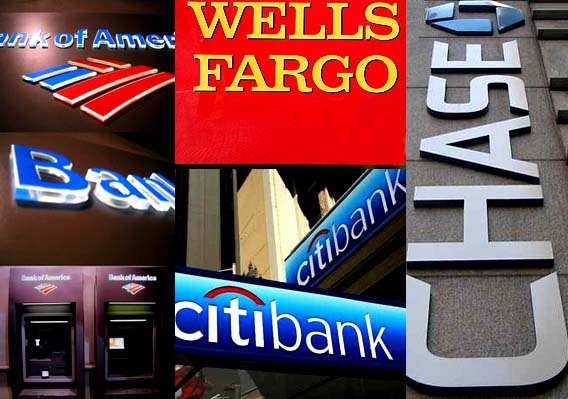The Securities and Exchange Commission has charged Bank of America and two subsidiaries with defrauding investors in offering of residential mortgage-backed securities (RMBS) by failing to disclose key risks and misrepresenting facts about the underlying mortgages.

[HOME ] [ABOUT] [PHOTOS] [VIDEO] [BLOG] [HOUSTON] [TEXAS] [U.S. NEWS] [WORLD NEWS] [SPORTS] [POP CULTURE] [CONTACT]
SEC and DOJ charge Bank of America with massive mortgage and securities fraud

by Joseph Earnest August 7, 2013
Newscast Media CHARLOTTE, N.C—If Bank of America goes down, the rest (CITI, Wells Fargo, Chase, Deutsche Bank etc...) will follow. This is huge! The SEC usually charges the little guys like lawyers, but now they have stepped up and are going after the "too big to fails" as is demonstrated in this epic Bank of America lawsuit.
The problem with these banks is that they claimed these mortgage-backed-securities were owned by trusts, yet these trusts were defunct. They were empty, therefore the attorneys were acting on behalf of fraudulent trustees and trusts.
With the help of homeowners, whistleblowers and investigative researchers, the SEC has a program called the Frank-Dodd Whistleblower Act, that offers upto 30% of the amount they collect from banks, to those who provide pertinent information they can use to charge the banks in a lawsuit. For example if the SEC collects $100,000,000,000 in a legal judgment from the bank, the whistleblower gets anywhere from 10% - 30% for providing relevant information the SEC can use, i.e a check of between $10 mil - $30 mil is what the whistleblower gets. In this case the amount being sought is $850,000,000 so you do the math. Section 922 of the Frank-Dodd Whistleblower Act reads as follows below:
Section 922 (6) WHISTLEBLOWER.—"The term ‘whistleblower’ means anyindividual who provides, or 2 or more individuals acting jointlywho provide, information relating to a violation of the securities laws to the Commission, in a manner established, by rule or regulation, by the Commission.
‘‘(b) AWARDS.—‘‘(1) IN GENERAL.—In any covered judicial or administrative action, or related action, the Commission, under regulations prescribed by the Commission and subject to subsection (c), shall pay an award or awards to 1 or more whistleblowers who voluntarily provided original information to the Commission that led to the successful enforcement of the covered judicial or administrative action, or related action, in an aggregate amount equal to—
‘‘(A) not less than 10 percent, in total, of what has been collected of the monetary sanctions imposed in the action or related actions; and
‘‘(B) not more than 30 percent, in total, of what has been collected of the monetary sanctions imposed in the action or related actions."
Click here to read or download the Whistleblower Protection Act. (pop-up)
The SEC alleges that Bank of America failed to tell investors that more than 70 percent of the mortgages backing the offering – called BOAMS 2008-A, originated through the bank’s “wholesale” channel of mortgage brokers unaffiliated with Bank of America entities. Bank of America knew that such wholesale channel loans – described by Bank of America’s then-CEO as "toxic waste" – presented vastly greater risks of severe delinquencies, early defaults, underwriting defects, and prepayment. These risks all directly impact the returns to RMBS investors, however Bank of America only selectively disclosed the percentage of wholesale channel loans to a limited group of institutional investors. Bank of America never disclosed this material information to all investors and never filed it publicly as required under the federal securities laws.
"In its own words, Bank of America 'shifted the risk' of loss from its own books to unsuspecting investors, and then ignored its responsibility to make a full and accurate disclosure to all investors equally," said George S. Canellos, Co-Director of the SEC's Division of Enforcement. "This is one in a long line of RMBS-related enforcement actions brought by the SEC to hold entities accountable for wrongdoing connected to the financial crisis."
The Department of Justice today announced a parallel civil action against Bank of America for violations of the Financial Institutions Reform, Recovery, and Enforcement Act of 1989 (FIRREA).
According to the SEC's complaint filed in U.S. District Court for the Western District of North Carolina, Bank of America along with Banc of America Securities LLC (now Merrill Lynch, Pierce, Fenner & Smith) and Bank of America Mortgage Securities (BOAMS) conducted the $855 million RMBS offering in 2008. BOAMS 2008-A was offered and sold as a "prime" securitization appropriate for the most conservative RMBS investors.
The SEC alleges that Bank of America deceived investors about the underlying risks as well as the underwriting quality of the mortgages, misrepresenting that the mortgage loans backing BOAMS 2008-A were underwritten in conformity with the bank’s own guidelines. These mortgage loans, however, were riddled with ineligible appraisals, unsupported statements of income, misrepresentations regarding owner occupancy, and evidence of mortgage fraud. The key ratios of debt-to-income and original-combined-loan-to-value were routinely miscalculated, and then the materially inaccurate ratios were provided to the investing public.
According to the SEC's complaint, a disproportionate concentration of high-risk wholesale loans and the inclusion of a material number of loans failing to comply with internal underwriting guidelines resulted in BOAMS 2008-A suffering an 8.05 percent cumulative net loss rate through June 2013 – the greatest loss rate of any comparable BOAMS securitization. This resulted in losses of nearly $70 million with anticipated future losses of approximately $50 million. Bank of America’s repeated failures violated Sections 5(b)(1), 17(a)(2) and 17(a)(3) of the Securities Act of 1933.
The SEC's investigation was conducted by Mark Eric Harrison and Lucy T. Graetz of the Enforcement Division’s Structured and New Products Unit and the Atlanta Regional Office, under the supervision of Assistant Regional Director Aaron W. Lipson. The litigation will be led by Senior Trial Counsel Kristin B. Wilhelm, Regional Trial Counsel Graham Loomis, and Mr. Harrison. The Enforcement Division was assisted in its investigation by the SEC's Division of Corporation Finance.
Today's actions were coordinated by the federal-state RMBS Working Group that is focused on investigating fraud and abuse in the RMBS market that helped lead to the financial crisis. For more information about the reporting financial/mortgage fraud, visit www.stopfraud.gov.
|
|
Join the Newscast Media social networks
for current events and multimedia content.
Copyright© Newscast Media. All Rights Reserved. Terms and Privacy Policy
